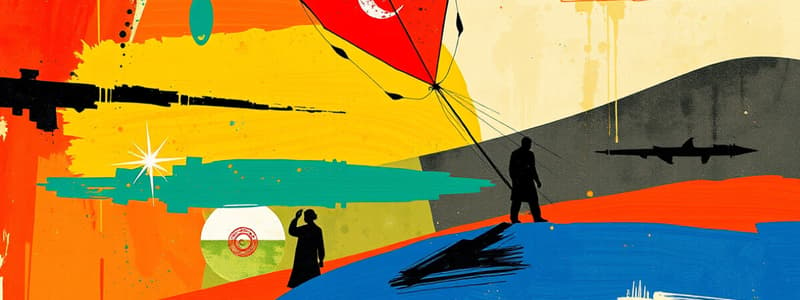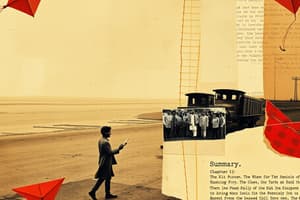Podcast
Questions and Answers
What event in December 2001 haunts Amir in Chapter One?
What event in December 2001 haunts Amir in Chapter One?
- A deserted alley (correct)
- A kite flying competition
- A wedding
- The end of the king's reign
What does the winter of 1975 symbolize for Amir in Chapter One?
What does the winter of 1975 symbolize for Amir in Chapter One?
The death of Amir's former self
What were Amir and Hassan doing together in Chapter Two?
What were Amir and Hassan doing together in Chapter Two?
- Playing soccer
- Flying kites
- Reading stories
- Shining mirrors and using a slingshot (correct)
Who is Baba in relation to Amir in Chapter Two?
Who is Baba in relation to Amir in Chapter Two?
Why does Baba never refer to Ali as his friend in Chapter Four?
Why does Baba never refer to Ali as his friend in Chapter Four?
Hassan and Amir carved their names into a pomegranate tree.
Hassan and Amir carved their names into a pomegranate tree.
What does Baba believe is the only sin?
What does Baba believe is the only sin?
Who threw a rock at Hassan in Chapter Five?
Who threw a rock at Hassan in Chapter Five?
Amir's first word was ______.
Amir's first word was ______.
Flashcards are hidden until you start studying
Study Notes
Chapter One
- December 2001 marks 26 years after a pivotal event in Amir's life.
- Amir is haunted by dreams of a deserted alley, recalling his unatoned sins.
- A sunny walk reminds him of Hassan and the phrase, "For you, a thousand times over."
- The winter of 1975 signifies the death of Amir's former self and shapes his identity.
Chapter Two
- Amir and Hassan share a close friendship filled with mischievous activities.
- Amir lives in a beautiful house with his father, Baba, while Hassan resides in a mud hut with his father, Ali.
- Both boys are motherless; Amir's mother died at childbirth and Hassan's mother abandoned him.
- Ali, Hassan’s father, is a servant and a Shia Hazara, while Baba is a wealthy Pashtun.
- Social hierarchy exists due to ethnic differences; Pashtuns oppress Hazaras, invoking prejudice.
- Hassan has a strong bond with Amir, evident in their shared childhood experiences and unique camaraderie.
Chapter Three
- Baba is characterized as a strong and influential figure, often referred to as "Mr. Hurricane."
- He builds an orphanage despite lacking architectural skills, reflecting his generosity.
- Baba’s rigid views see the world in black and white, believing theft to be the only true sin.
- Amir grapples with feelings of inadequacy, fearing Baba's disappointment connected to his mother's death.
- Baba desires Amir to be assertive, specifically in sports, which Amir does not enjoy.
Chapter Four
- Ali was adopted by Baba’s father after his parents were killed, establishing a bond between the families.
- Amir experiences internal conflict due to ethnic prejudices against Hazara people.
- Daily life shows Hassan's loyal servitude, contrasting Amir’s carefree lifestyle and school responsibilities.
- The boys carve their names into a tree, symbolizing their close bond and shared heritage.
- Amir feels intellectual superiority over Hassan, who struggles with literacy.
- A story written by Amir reveals deeper emotional conflicts and complex father-son dynamics.
Chapter Five
- Nighttime violence signifies the transformation of Afghanistan, paralleling historical atrocities.
- A coup led by Daoud Khan marks the end of the Afghanistan Amir knew.
- Assef attacks Hassan with a rock, showcasing the brutality typical of their environment.
- Assef embodies hatred towards Hazaras, paralleling Nazi ideology against Jews, reflecting deep-seated ethnic tensions.
Studying That Suits You
Use AI to generate personalized quizzes and flashcards to suit your learning preferences.




